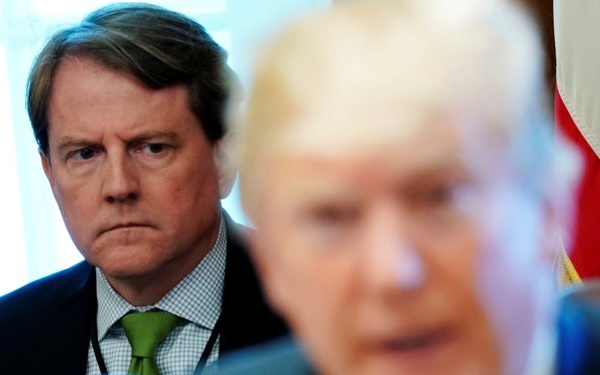Then-White House Counsel Donald McGahn looks on as Donald Trump speaks (File)
UPDATE, JUNE 5:
Don McGahn, the White House Counsel in the Trump Administration, has testified behind closed doors to a House committee.
“People familiar with the testimony” said McGahn’s answers were limited, with a deal restricting questions to matters that were publicly revealed in the Mueller Report on Trump-Russia links.
The lawyer clung to an account that he had already given Special Counsel Robert Mueller. He often told the committee that his recollections of events from 2017-2018 — when he was involved in Trump’s schemes that Mueller said were evidence of obstruction of justice — were no longer sharp.
Democrats still saw a positive outcome after Donald Trump blocked McGahn’s appearance since 2019.
“I believe we have been vindicated in terms of the intimacy of his involvement and the ultimate conclusions of the Mueller Report,” Rep. Sheila Jackson Lee of Texas, told reporters. “The Congress has to be respected with its subpoena and oversight responsibilities.
McGahn has up to a week to review a transcript for accuracy before it is released.
ORIGINAL ENTRY, MAY 25: Don McGahn, the White House Counsel in the Trump Administration, agrees to testify behind closed doors before the House Judiciary Committee next week about Donald Trump’s efforts to obstruct the Trump-Russia investigation.
An agreement had been reached earlier this month for McGahn’s testimony, but the scheduling was delayed to see if Trump would launch a legal challenge, according to “people familiar with the matter”.
Trump lawyer Patrick Philbin had indicated that Trump intended to intervene, possibly seeking to invoke executive privilege. However, Philbin said last week that Trump will not make a challenge. He gave no reason for the change in position.
As President, Trump tried to block Congressional subpoenas, including through lengthy court battles and appeals. That tactic prevented information being made public before the November 2020 election.
But those legal efforts were funded by the Government. Trump now has to pay the costs himself.
The House Judiciary Committee sought to question McGahn in 2019 after he was identified as a key witness in the Mueller Report about links between the 2016 Trump campaign and Russian officials.
The report cited significant evidence for at least eight occasions when Trump obstructed or tried to obstruct the investigation.
McGahn, who spoke for 30 hours with Mueller’s team, is a central figure in two of the cases. In June 2017, Trump ordered McGahn to contact Deputy Attorney General Rod Rosenstein, who formally oversaw the investigation, and have him fire Special Counsel Robert Mueller. In early 2018, after stories broke about the incident, Trump instructed McGahn to deny any attempt at Mueller’s dismissal.
After the report was published, White House officials asked McGahn to make a public statement clearing Trump. When he refused, Trump instructed McGahn not to comply with a subpoena. The Judiciary Committee sued, and the case is now before the Court of Appeals for the Washington D.C. Circuit.
EA on Monocle 24: White House Blocks McGahn Testimony Over Trump’s Obstruction of Justice
Justice Department Balks at Release of Full Memo Over Protection of Trump
The Justice Department has balked at publishing all of a memorandum underpinning Attorney General William Barr’s protection of Trump over the Mueller Report in spring 2019.
The Department released the first two pages of the internal document on Monday night in response to an order by Judge Amy Berman Jackson. However, it withheld the other six pages.
See also Federal Judge: Ex-Attorney General Barr Misled Congress on Trump-Russia
Jackson found in March that Barr and the Justice Department misled Congress and the public.
Trying to pre-empt the report, Barr issued a deceptive four-page memorandum in March 2019 that the Mueller Report had found “no collusion” between the Trump campaign and Russian officials.
In fact, Special Counsel Mueller said he was not considering “collusion”, as the term had no legal standing.
In the Justice Department’s internal memorandum for Barr, two senior officials claimed there were important Constitutional reasons not to accuse a President of a crime. They went farther in declaring that the evidence gathered by Mueller did not rise to the level of a prosecutable case.
Certain of the conduct examined by the Special Counsel could not, as a matter of law, support an obstruction charge under the circumstances. Accordingly, were there no constitutional barrier, we would recommend, under the Principles of Federal Prosecution, that you decline to commence such a prosecution.
Judge Jackson, who saw the full memorandum, noted the Barr did not follow the advice of the Justice Department’s Office of Legal Counsel. Instead, his decision to cover for Trump and the OLC memo “were being written by the very same people at the very same time”, working “hand in hand to craft the advice” that was cited in the Attorney General’s pre-emption of the Mueller Report.

